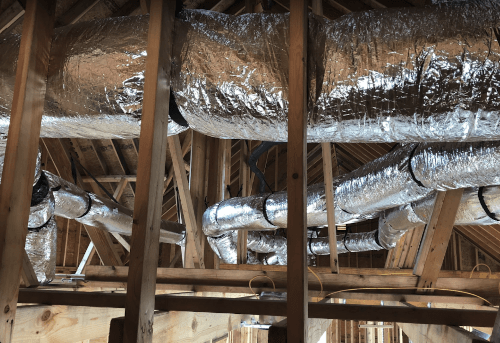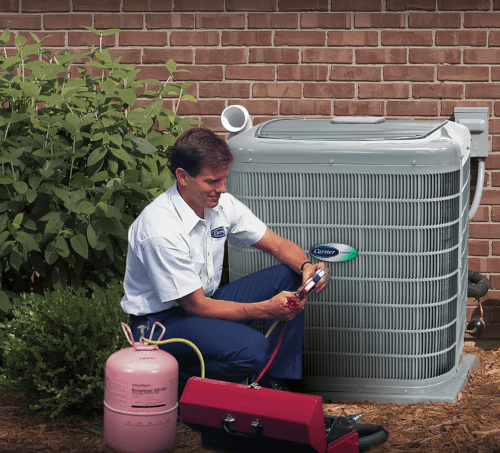Air conditioners have two main jobs: to cool your home’s air and to dehumidify it. So yes, your AC can—and should!—remove humidity from your home in San Marcos, TX and the surrounding areas. But is it doing so?
Typically, your home’s air should have a humidity level between 40% and 60%. That might seem high, but compared to Texas’ high outdoor humidity, which averages above 70% during the summer months, your home’s air feels practically dry.
If your home feels extremely humid and damp even when your AC runs, your unit might have a problem. To increase your AC’s dehumidifying capabilities, try:
- Scheduling regular maintenance
- Getting your AC professionally sized
- Checking your ventilation system for leaks and blockages
The humidity level of your home’s air impacts how comfortable it feels. If you’re stuck in a hot or humid house, try these tips so you can enjoy spending time at home again!
Don’t wait to get relief from your humid home! At Reliable Air, we offer same-day service and 2-hour scheduling windows, so you can have a professional over to perform an AC repair or tune-up ASAP. Give us a call at (512) 580-8837 to schedule service today!
Schedule Regular Maintenance

Your AC’s dehumidification duty occurs at one vital place in your unit: the evaporator coil. In order to understand the importance of the evaporator coil—and how regular maintenance can keep it working smoothly—it’s helpful to understand how your AC naturally dehumidifies your home’s air.
Although it might feel like your AC unit creates cold air, AC units actually remove heat and water vapor from your home’s air to make it comfortable. The process works like this:
- Hot air is pulled into your AC unit through your home’s vents.
- This air is blown through your vents to your AC’s evaporator coil. The evaporator coil is filled with liquid refrigerant and is very cold.
- Hot air blows over the evaporator coil, where it transfers heat to the cold refrigerant, making the air feel colder.
- At the same time, water vapor condenses into liquid water and collects on the evaporator coil as condensation. The water vapor leaves the AC unit by traveling through the condensate drain.
- Treated air is pushed back out into your home through your vents. Because this air has deposited water and heat at the evaporator coil, it feels cooler and less humid.
As you can see, the evaporator coil is a pretty important component of your AC unit. If dust or dirt collects on your evaporator coil, it can interfere with your AC’s cooling and dehumidification functions.
Leaking refrigerant can also impact your home’s humidity since it is what draws water vapor out of the air and causes it to condense into liquid water. When there isn't enough refrigerant in your AC system, your unit won’t be able to pull as much water vapor out of the air, making your home feel more humid. In a typical maintenance checkup, an HVAC technician will clean the evaporator coil and check for any refrigerant leaks. It’s important to have your AC maintained at least once a year before the cooling season begins to check for failing parts and prevent a full-blown breakdown during the hot summer months.
Get Your AC Professionally Sized
You might think a bigger AC unit would make your home feel more comfortable, but you’d be wrong. When it comes to AC size, installing a unit that’s too big or too small can cause your home to feel more humid.
If an AC unit is too big, it will short cycle. Short cycling means that the AC unit turns off before finishing a cooling cycle, causing it to turn back on and off more frequently than necessary.
Short cycling occurs because the AC is too powerful for the home. When the unit turns on, it blasts cold air into a small portion of the home; its sensors then register that the area around the AC is cooled, so the unit turns off. Once the air has time to circulate in the home, the AC registers that the home was not adequately cooled, so it turns back on again.
Short cycling increases wear and tear on your AC, the cost of your energy bill, and the likelihood that your AC will require frequent repairs. It also makes your home feel more humid since only a small amount of air is being dehumidified each time your AC turns on and off.
On the other hand, small AC units also make your home feel humid. That’s because small ACs aren’t powerful enough to treat all the air in your home. They’ll run constantly trying to cool and dehumidify your home, but they still won’t be able to treat all the air before it gets hot and humid again. The best way to ensure your AC is correctly sized is to consult a professional. They’ll do a “load calculation,” which will consider the size of your home, the humidity of your climate, and several other factors to determine the best size of AC or heater for your home.
Check Your Ventilation System for Leaks and Blockages

For your home to feel comfortable, it’s important that humidity is removed from as much air as possible. If your vents are closed or blocked by furniture or your ducts are leaking, your home will feel more humid.
Blocked or closed vents don’t allow as much air to flow into your AC system. This then reduces the amount of air that can be dehumidified. Since only a little bit of air enters your AC unit to be treated at a time, your home will stay very humid.
Leaking ducts also prevent an adequate amount of air from being treated (and dehumidified) by your AC. If air leaks out of your ducts on the way to the evaporator coil, there will be less air to be dehumidified by the refrigerant once it arrives.
Reliable’s Not Just Our Name; It’s Our Guarantee

When you schedule service with Reliable Air, you know you’re entrusting your HVAC system to service technicians who will be on time, highly trained, and, well, reliable! We have over 25 years of experience putting our customers first and would love to add you to our list of satisfied customers.
With same-day service and convenient appointment windows, you can schedule your AC repair when it works best for you. If you’re not completely satisfied with our work, we’ll do whatever it takes to make things right. We believe in a different kind of business model: putting people ahead of profits. If you need an HVAC expert, call us at (512) 580-8837 to schedule service.

